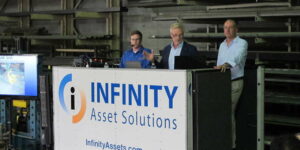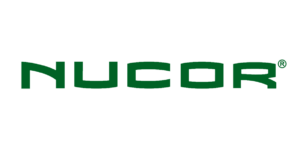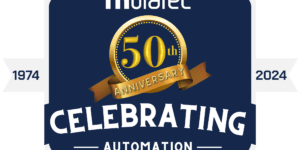Next Generation Grinding Technology
Take a look at how this gear specialist and machine shop used new Swiss grinding technology with an advanced CNC to cut their cycle time on one gear from 40 minutes down to six minutes.
Posted: November 6, 2014
Nestled inside Winnebago County, 90 miles northwest of Chicago, IL, the small village of Roscoe can make a claim to be the gear capital of the Midwest. Certainly, on a per capita basis, this town has its share of world-class gear companies.
One of them, Custom Gear & Machine, Inc., was founded in 1994 and has grown into a full-service gear manufacturer that produces spur and helical gears to AGMA 8 thru 14 standards and up to 30 in diameters typically, plus splined shafts up to 54 in long. Its customers include many of the leading builders of agricultural equipment, construction and off-road vehicles, machine tools, printing presses, food processing equipment, overhead cranes, materials handling devices, lift equipment, process equipment such as large water pumps and more.
Custom Gear also operates a full machine shop with four-axis vertical machining centers, horizontal machining centers, sawing and broaching equipment, plus a full turning machine department, capable of handling 29 in diameter and 72 in long workpieces. The quality department boasts CNC gear inspection machines and CMM capability. Production specializes in lot runs from a single piece up to 500 and works primarily in steel bar grades, including 4140, 4150 and 8620. The shop also works forgings, as well as cast and ductile iron, brass, bronze and aluminum, per customer requirements. All of these products are often used in gearboxes and transmissions by equipment builders or their primary tier component suppliers.
Custom Gear recently purchased an additional Reishauer gear grinder and, on one job, has seen the cycle time drop from 40 minutes to only six minutes, according to Tim Rose, the vice president of manufacturing, who runs the business with co-owners Dave Patterson and Mike Rasmann. Rose notes, with some considerable pride, that many of the machinists at Custom Gear have more than 20 years in the business, most of them with his company. “We are a real family here. You cannot put a price on the value that brings to our company and, by extension, to our customers.”
He continues, “We were looking to expand our gear grinding capability and the Reishauer RZ400 offered us many benefits, including 400 mm OD, 10 mm root diameter, up to 999 teeth capability, helix angles to ±45 deg and a Z-axis of 300 mm, all features we could use on a daily basis. We also liked the easy access four-door configuration and serial interface, plus the machine’s auto wheel dresser and add-ons of materials and part handling devices.”
The shop was already running an older Reishauer grinder but was seeking to improve its throughput and overall grinding department performance. The RZ400 has three features that helped them these goals. The machine tool had more than double the surface speed, going from 1,900 rpm to 4,000 rpm. It also had a seven-start grinding wheel versus a single-start variety. And, with a coolant pressure increase over the older machines from 30 psi to 300 psi, the flushing and grinding integrity were radically improved.
During this grinder purchase, Custom Gear was serviced by Reishauer Corporation vice president Dennis Richmond, who heads up the North American sales and service operation in nearby Elgin for this Swiss-based machine builder, which founded in 1788 in Zurich. He describes how the relationship with Custom Gear and Siemens Industry, Inc. (Elk Grove Village, IL) played a role in this operation.
“Our previous gear grinders at Custom Gear only allowed them a 13 in diameter and they were looking to step up to a larger 16 in maximum diameter, plus they were seeking other features we were able to offer,” explains Richmond. “We use Siemens numerical controls on our machine tools for a variety of reasons, especially the architecture’s ability to allow our engineers to customize the front ends. This simplifies the addition of new part programs and helps operators more easily navigate the programming and set-up. When the data input is completed for the current screen, for example, the operator is prompted to enter data for the next screen and so on, until the program is completed.”
Rose confirmed this point, adding that his machinists are each responsible for the set-up, running and maintenance of their machine. “They take real pride in making sure the jobs are done right and that the machine is always in great shape.” Daniel Warren is one of the current machinists running the Reishauer RZ400. He says that he had never run a machine with a Sinumerik CNC from Siemens onboard. “I got great training from Reishauer and was up to speed very quickly,” he says. “We were making parts within a few days after the installation and I was completely comfortable with the easy operation of the CNC in less than a month.”
In describing the automatic wheel dressing sequence, Warren also noted how the CNC automatically adjusts the settings to compensate for the reduced wheel diameter after dressing, bringing the wheel to the correct point of contact with the subsequent workpieces, every time. Data such as gear configuration, fixture design and all tool settings are entered into the screens, including pitch, pressure angle, teeth and dressing steps. Once a new part program is completed, the operator at Custom Gear can begin working through the Reishauer-designed man-machine-interface (MMI) set-up screens, which also function in the same manner.
Reishauer further allows its customers to add their own HMI screens for features onto the Siemens CNC for data acquisition, training aids and even SPC protocol operations. This service enables users to have a common look across the screens on many machines in their shop, which is especially helpful in work cell set-ups, where a single machinist is running multiple machines.
Reishauer also uses other aspects of the Siemens product and service package for added functionality, including motor and drive packages, in building the control structure on its machines. According to Richmond, this allows a seamless integration between all drives and the numerical control unit (NCU). It also makes a much easier task out of the integration of ancillary machine devices such as chip conveyors, filtration systems, wheel dressing stations and especially the critical materials handling and part loading devices frequently built with its machines for work cell set-ups.
Siemens makes use of the Profibus networking protocol that enables Reishauer to link various control devices and other machine tools together to greatly reduce the field work integration and wiring time during installs. Reishauer uses Profibus to link the onboard Sinumerik 840D CNC to VFDs and other drives, electronic gearboxes and balancing systems for the grinding wheel on its machines.
Another feature of the Reishauer RZ400 is its unique Sinorix® fire suppression system that was provided by Siemens Building Technologies, a sister company of Siemens Motion Control. The Sinorix® fire suppression system relies on the patented Sinorix™ 227, a clean, fast-acting fire suppressant that extinguishes machine oil or coolant fires in seconds without harming the operator, environment or the machine tool components. Sinorix 227 suppressant is based on HFC 227ea technology for fast and reliable extinguishing.
In most cases recorded by the manufacturer, use of this fire suppression system has resulted in machine tool restart within 24 hours. This contrasts with the typical machine tool fire scenario that often damages critical components beyond repair and requires a complete retrofit, causing excessive downtime and loss of production. Furthermore, many fire suppression systems currently used in the machine tool business operate with agents that extinguish the fire but contaminate the process fluids and pose potential risk to the machinists in the immediate area. The Sinorix agent leaves no residue and can be easily recharged and put back in service.
According to Rose, “Though we have not yet needed this system, we know fires occur on machine tools; that is a fact of life. When we saw its effectiveness demonstrated by the machine builder’s video, we immediately knew it was a system we wanted in our shop.”
“Our investment in the new Reishauer gear grinder has expanded our capability, allowed us to produce more parts for more existing customers and even opened some new business doors for us,” concludes Rasmann, the vice president of operations at Custom Gear. “With the added benefit of increased safety on the machine, it was a win-win situation for us all around.” Rose echoes this sentiment, adding, “It’s a great machine. When we have any need for assistance, including parts and especially application engineering, we know the answer is just a phone call away. Reishauer has been there for us on many occasions, which is a big reason we’ve done business with them for 15 years and will continue to do business with them in the future.”
Custom Gear & Machine, Inc., 5466 East Rockton Road, Roscoe, IL 61073, 815-389-6065, Fax: 815-389-4548, TimRose@cgearinc.com, www.cgearinc.com.
Siemens Industry, Inc., Drive Technologies-Motion Control-Machine Tool Business, 390 Kent Avenue, Elk Grove Village, IL 60007, 847-640-1595, Fax: 847-437-0784, SiemensMTBUMarCom.sea@siemens.com, www.SiemensCNC.com.

















